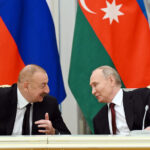Not long ago I wrote here at Asia Times that Azerbaijan had become a new “vector” for the foreign policies of the Central Asia countries. Now the European Union has signed a memorandum of understanding “on a Strategic Partnership in the Field of Energy” with Azerbaijan.
The meeting had been scheduled for some time by European Commissioner for Energy Kadri Simson. At some point, when it became clear that it would be of outstanding significance, EC President Ursula von der Leyen was brought in to head the delegation. In this role, she signed the MoU on July 18.
The significance of the multiple meetings in Baku, however, go far beyond the energy cooperation. In effect, they bring the EU’s relations with Azerbaijan to a new level, and one that is fully recognized by both sides as a relationship between equals.
The energy-related provisions contained in the MoU have gotten the most attention. I will discuss these below, but it must be underlined that they represent only one of three main baskets of accomplishments.
Transit hub
The first main point, to which the MoU only alludes, is the recognition of Azerbaijan’s future role as a contractor and shipper or, simply put, as a general transit hub for the EU looking eastward to the east shore of the Caspian Sea and beyond. Simply put, Brussels has now officially recognized that Azerbaijan is set to become a “gate” for deepening the EU’s of relations with Central Asia.
In another article for Asia Times, I recently discussed details of this development, including logistical considerations, on the Trans-Caspian International Transit Route (TITR), which is increasingly now being referred to as the “Middle Corridor.”
The second main point of the meetings – not contained in the MoU, which is limited to the energy sector – looks forward to the conclusion, perhaps as soon as this year, of a new and upgraded framework agreement to replace the EU-Azerbaijan Partnership and Cooperation Agreement in force since 1999. It will be a comprehensive document embracing humanitarian issues, public administration, the economy, and possibly even security issues.
By July 19, just after the signing of the MoU in Baku, Azerbaijani Foreign Minister Jeyhun Bayramov was co-chairing in Brussels, with the EU’s High Representative for Foreign Affairs and Security Policy, Josep Borrell, the 18th meeting of the EU-Azerbaijan Cooperation Council.
It focused on bilateral partnership priorities and sectoral cooperation, as well as on implementation of the economic and investment plan foreseen in the framework of the Eastern Partnership.
Energy transfer
The third main point of the meetings in Baku turned on the issues agreed in the MoU on a strategic energy partnership. Beyond the important issues of cooperation in developing renewable energy and measures for environmental protection was the commitment to export, through the Southern Gas Corridor (SGC), “at least 20 billion cubic meters of gas annually by 2027” that got the headline attention.
What are we to make of this? On the demand side, Azerbaijan’s main target markets for gas since 2020 have been Italy, Greece and Bulgaria. The Interconnector Greece-Bulgaria (IGB) recently entered service with a capacity of 1.5 billion cubic meters per year (bcm/y), which can be doubled to 3bcm/y with technical improvements.
Azerbaijan’s gas exports to Europe are already on track to increase from 8.1bcm in 2021 to 12bcm in 2022. The Trans-Adriatic Pipeline (TAP), which takes the gas to Italy under the Adriatic Sea after it has transited Greece and Albania, has a current capacity of 10bcm. This might be bumped up slightly without further technical improvement.
However, it is clear that even if the gas from the Caspian Sea to Europe also eventually arrives in North Macedonia and Serbia, this will be in relatively small quantities because of the small demand in the markets there. Therefore what must be involved is the long-planned doubling of the TAP’s capacity from 10 to 20 billion cubic meters per year.
That would not require the construction of a second pipeline but, basically, only the installation of more compressors and other minor infrastructure. It is a question for investors whether this will be worth it, if the EU cuts off such gas imports after 2030 in conformance with its stated climate policy. All depends on signing actual contracts for delivery.
But where would this additional gas come from? For whatever reason, Azerbaijan’s own offshore fields such as Umid and Babek, which it identified and began to explore with foreign partners as many as a dozen years ago, were never developed. The year 2027 looks optimistic, unless natural gas is sourced also from either Turkmenistan or Kazakhstan. Therefore, attention turns to the east shore of the Caspian Sea.
Azerbaijani observer Elnur Eminoglu wrote, in a newspaper considered often to reflect the views of the president’s office, that Azerbaijani diplomacy is working “seriously and without much publicity” in order “to attract Turkmenistan as well as Kazakhstan to implement Baku’s energy projects … but the process takes time, because in addition to technical solutions, there are also geopolitical collisions that also require serious study.”
Those “collisions” must be the subject for another article. However, all developments of the past four years, including but not limited to the signature of the Convention on the Legal Status of the Caspian Sea and the resolution of the dispute between Azerbaijan and Turkmenistan over an oil and gas field in the middle of the Caspian, give reason to believe that these initiatives will eventually be crowned with final success.
And that will be yet another story to tell.
Robert M. Cutler










